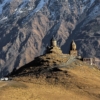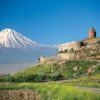[ザンジバル] スパイス・アイランドはフレディ・マーキュリーの故郷
2019-03-09アフリカ, ソウル・R&B, ボサノヴァ, ロック
スポンサーリンク

ザンジバル(Zanzibar)はスパイス交易の拠点として栄えたアフリカ東海岸の島(スワヒリ語名はウングジャ島、Unguja)。島の中心はストーンタウン(Stone Town)。もしかしたらフレディ・マーキュリーの出生地としての方が有名かもしれません。
ザンジバルというタイトルの曲
本記事ではザンジバルの歴史を簡単に紹介したいのですが、その前にこの地をタイトルにした音楽を聴いてみてください。どちらも大御所です。
“Zanzibar” Billy Joel(1982)
この曲のザンジバルは島のことではなく、ニューヨークのジャズバーの店名のようですが、ロックテイストとジャズテイストの混在が面白いです。
“Zanzibar” Earth Wind & Fire(1973)
アース・ウィンド&ファイア初期のインストルメンタル。この曲が収録された “Head to the Sky” というアルバムのオリジナルはレコード。B面は “Clover”(名曲!)とこの2曲のみという趣向になっています。
“Pra Dizer Adeus” Edu Lobe with Tom Jobim(1981)
Zanziberの作曲者はボサノヴァの巨匠エデゥ・ロボ(Edu Lobo)。アントニオ・カルロス・ジョビン(Tom Jobimとも)との共作で、名曲 “Pra Dizer Adeus”(”To Say Goddbye”)をどうぞ。このけだるい感じ、悪くありません。
歌詞(ポルトガル語)
Adeus
Vou pra não voltar
E onde quer que eu vá
Sei que vou sozinha
Tão sozinha amor
Nem é bom pensar
Que eu não volto mais
Desse meu caminho
Ah, pena eu não saber
Como te contar
Que o amor foi tanto
E no entanto
Eu queria dizer
Vem
Eu só sei dizer
Vem
Nem que seja só
Pra dizer adeus
Adeus
Vou pra não voltar
E onde quer que eu vá
Sei que vou sozinho
Tão sozinho amor
Nem é bom pensar
Que eu não volto mais
Desse meu caminho
Ah, pena eu não saber
Como te contar
Que o amor foi tanto
E no entanto
Eu queria dizer
Vem
Eu só sei dizer
Vem
Nem que seja só
Pra dizer adeus
Adeus!
英語対訳(by Google翻訳)
bye
I will not go back
And wherever I go
I know I’m going alone.
So alone my love
It’s not good to think
That I will not come back
From this my way
Ah, sorry I did not know
How to tell you
That love was so much
And yet
I wanted to say
Comes
I only know how to say
Comes
Even if it’s just
To say goodbye
bye
I will not go back
And wherever I go
I know I’m going alone.
So alone my love
It’s not good to think
That I will not come back
From this my way
Ah, sorry I did not know
How to tell you
That love was so much
And yet
I wanted to say
Comes
I only know how to say
Comes
Even if it’s just
To say goodbye
Bye!
ザンジバル略史
さて、ここからが本題です。ザンジバル島は宝島(スパイスの宝庫)。この富を巡って様々な支配者の興亡が繰り広げられてきました。

古代からイスラム商人(ペルシャ人、アラブ人)が流入し(アフリカ・ネイティブのバトゥー語とアラブ語の混淆によりスワヒリ語が成立)、中世にはモザンビークからザンジバルにかけてをアラブ人のキルワ王国が支配。その後ポルトガルの植民地、オマーン帝国の植民地を経て、イギリスが介入し、1964年のザンジバル革命で独立を果たしました。中世以降は、インド諸島やインド亜大陸を結んだインド洋スパイス交易の中継基地となりました。宗教はイスラム教徒がほとんどです。

現在は対岸のタンザニア連合共和国の一部として革命政権の下、強力な自治権を保持しています。近年は観光リゾートとして人気を集めています。

スパイス・アイランド

スパイス交易の歴史を紹介した記事を英日対照形式で紹介します。
The History of Spice(スパイスの歴史)
インド諸島の原産地から古代エジプトや中国へ
The use of spices is almost as old as human history itself. As far back as 2600BC, there are records of the Egyptians feeding spices obtained from Asia to labourers building the great pyramid of Cheops, to give them strength.
スパイスと人類のつきあいは人類の歴史そのものと同じくらい古い。紀元前2600年頃、エジプトではクフ王の大ピラミッドの建設従事者に、アジアから買いつけたスパイスを与えて滋養をつけさせた。
Long before the 6th century BC, when Confucius advocated the use of ginger, the Chinese were obtaining spices from the tropics. Europe imported them before Rome was founded.
紀元前6世紀、中国では孔子が生姜の摂取を薦めたが、そのはるか以前に、熱帯産のスパイスが中国に来ていた。ヨーロッパにスパイスが輸入されたのはローマ建設より前である。

オマーンとヨーロッパ人の争奪戦
As the Portuguese conqueror Vasco da Gama’s men came ashore in Western India in the 15th century, their battle cry was,”For Christ and spices!” Spices were the first luxury goods to appear in the European economy.
Plants such as pepper, cinnamon, ginger and nutmeg grew naturally only in the tropics – principally the islands of the Indonesian archipelago and the coastal regions of India.
15世紀、ポルトガルの征服者ヴァスコ・ダ・ガマの船がインド西岸に接岸したとき、彼らの鬨(とき)の声は「主とスパイスのために!」であった。
コショウ、シナモン、ジンジャー、ナツメグなどの植物は熱帯の主にインドネシア諸島とインドの沿岸部にしか自生しない。スパイスはヨーロッパ経済に初めて登場した贅沢品だったのである。

高値で流通した贅沢品
Such places were, to the Europeans of the middle ages, as remote as the reaches of outer space. The use of spices as seasonings in food was a status symbol – the exotic nature of spices, only obtainable in far-off, unknown lands, was an emblem of the wealth and prestige of anyone who could afford to use them.
中世のヨーロッパ人にとって熱帯地方は大気圏外の宇宙と同じくらい遠い場所だった。スパイスを調味料に使うことがステータスシンボルになった。はるか彼方の未知の土地でしか手に入らないスパイスのエキゾチックさは、それを購入できる人間の富と名声の象徴だったのである。
This symbolic value appears also in the use of spices beyond meals and banquets. They were presented as gifts of state, and were bequeathed in wills together with other heirlooms. Rents and debts could even be paid in spices rather than gold.
スパイスの象徴的価値は、やがて日々の食事や晩餐会を超えて、国家の贈答品の地位を得る。他の家宝とともに遺言に残される遺品になり、金の代わりにスパイスで賃料や借金を支払うケースも増えた。

ヨーロッパ列強のスパイス探し
The hunger for spices in Europe led to desperate and brutal competition between the major trading powers to control the shipping routes that brought spices to their markets. Dutch, Portuguese, English and Spanish governments dispatched intrepid merchant companies to the Far East in search of the elusive source of the spices for which their citizens were clamouring.
貪欲なスパイス獲得欲に駆られたヨーロッパ諸国はスパイス交易ルートの確保と独占に熾烈な争いを繰り広げた。オランダ、ポルトガル、イギリス、スペインの各政府は、市民の旺盛なスパイス需要を満たすべく、人知れず存在するスパイス供給地を求めて、怖いもの知らずの商人たちを熱帯アジアに派遣した。
Many never returned, shipwrecked, lost or murdered in the unknown, uncharted waters of the world’s oceans. But eventually, the European powers gained control of the production of spices, obtaining the spice plantations of the Far East by simple force, and wresting domination of the spice trade from the Arabic merchants who had been supplying spices to the rest of the world for centuries before.
商人の多くは見知らぬ海の果てで難破するか道に迷うか殺されるかして二度とヨーロッパに戻らなかった。しかしヨーロッパ諸国は次第に世界のスパイス生産を支配していった。武力でアジアのスパイス農園を獲得し、何世紀もの間、世界のスパイス交易を担ってきたアラブ商人と権益を争った。

海賊の暗躍
Once the European merchants gained a toehold in the Indies, the home of the most valuable spices, they attempted to establish a monopoly, punishing by death anyone who attempted to smuggle seeds or plants off their remote island plantations. But even these desperate tactics were useless in the face of the demand for spices – daring international spice pirates stole the plants (nutmeg, cinnamon or cloves) and replanted them in far-off locations, breaking the monopoly and ensuring the freedom of the spice trade forever.
ヨーロッパ商人は稀少スパイスの産地である東インド諸島に足がかりを得ると、離島の農園から種や苗を密輸を試みる者を殺害するなど、あらんかぎりの手段で権益の独占を狙ったが、スパイ需要の高まりの前に無力だった。国をまたいだ命知らずの海賊たちが、ナツメグやシナモンやクローブの苗を盗み出し遠隔地で栽培して独占を打ち破り、スパイ交易を恒久的に自由化してしまったからだ。

スポンサーリンク
Earth Wind & Fire, Edu Lobo, zanzibar, アフリカ, アラブ人, アラブ商人, アントニオ・カルロス・ジョビン, アース・ウィンド&ファイア, イスラム教, インド諸島, エジプト, エデゥ・ロボ, オマーン, キルワ王国, クローブ, コショウ, ザンジバル, シナモン, スパイス, スパイス・アイランド, スパイス交易, スワヒリ語, タンザニア, ナツメグ, ビリー・ジョエル, ペルシャ人, ボサノヴァ, ポルトガル, ヨーロッパ, ヴァスコ・ダ・ガマ, 中国, 海賊, 英語
Posted by tokoshie
スポンサーリンク
関連記事
[競馬2021] 前半G1戦略と戦績(ダービー時点:10戦6勝0敗2分2不参加)
お知らせ(2021.5.31) しばらくブログ更新を休みます。本業のトレードが忙 ...
[競馬] 桜花賞、皐月賞(2020-21年)
2020年春の桜花賞からG1のみ競馬関連のツイートを投稿しています。相当高い的中 ...
[ジャズとクラシックPL] クラシック曲のジャズアレンジもの
曲目一覧 "Beethoven: Allegretto from Symphon ...
[ブラジル] “Francesa” by Ricardo Silveira 大御所スタジオ・ミュージシャンのアコギ・インスト曲
リカルド・シルヴェイラ リカルド・シルヴェイラは1954年生まれ。ブラジルはリオ ...
[日本] 建国私説―カタストロフィの生き残りがつくったまほろば
日本は不思議な国です。遺伝子解析、言語系統、考古学・・・どんなアプローチで迫って ...
[コーカサス] アルメニアとジョージア、旅するならどっち?トラベラー目線のガチンコ勝負
当サイトのモチーフはエキゾチック&エソテリック(exotic & eco ...
[アルメニア] 文明の交差路・古きキリスト教国家
外務省基礎データによると、アルメニアの人口は300万ほど、その1/3は首都エレバ ...









![[ペルシャ]「世界宗教」の起源は古代イラン? [ペルシャ]「世界宗教」の起源は古代イラン?](https://music.tokoshie-jp.com/wp-content/uploads/2018/10/ca242355f24ac02093a0370690d76b0a-100x100.jpg)
![[プログレ] プログレ寄り初期クイーン曲とプログレ・サンプラー [プログレ] プログレ寄り初期クイーン曲とプログレ・サンプラー](https://music.tokoshie-jp.com/wp-content/uploads/2019/01/2019.01.26_Prog-bands-100x100.jpg)
![[北海道] 幾春別の廃墟探訪と倉橋ルイ子 [北海道] 幾春別の廃墟探訪と倉橋ルイ子](https://music.tokoshie-jp.com/wp-content/uploads/2018/01/07137bded58a628f11674cd2a92c886f-e1515583721967-100x100.jpg)




ディスカッション
コメント一覧
まだ、コメントがありません